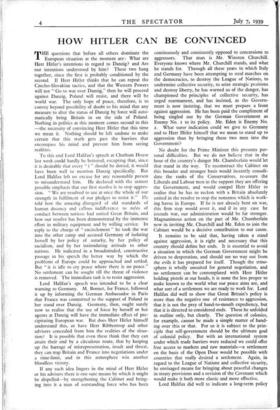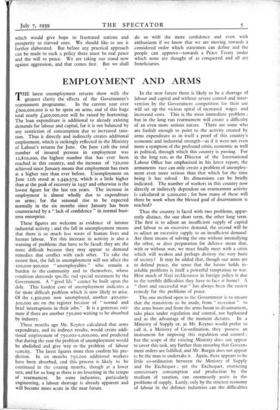HOW HITLER CAN BE CONVINCED
THE questions that before all others dominate the European situation at the moment are : What are Herr Hitler's intentions in regard to Danzig? and Are our intentions understood by him? These two hang together, since the first is probably conditioned by the second. If Herr Hitler thinks that he can repeat the Czecho-Slovakian tactics, and that the Western Powers will not " Go to war over Danzig," then he will proceed against Danzig, Poland will resist, and there will be world war. The only hope of peace, therefore, is to convey beyond possibility of doubt to his mind that any measure to alter the status of Danzig by force will auto- matically bring Britain in on the side of Poland. Nothing in politics at this moment comes second to this —the necessity of convincing Herr Hitler that this time we mean it. Nothing should be left undone to make certain that this truth gets past the barriers that encompass his mind and prevent him from seeing realities.
To this end Lord Halifax's speech at Chatham House last week could hardly be bettered, excepting that, since it is desirable that every " i " should be dotted, it would have been well to mention Danzig specifically. But Lord Halifax left no excuse for any reasonable person to misunderstand him. He declared with the utmost possible emphasis that our first resolve is to stop aggres- sion. " We are resolved to use at once the whole of our strength in fulfilment of our pledges to resist it." He told how the amazing disregard of old standards of human decency and callous indifference to rules of conduct between nations had united Great Britain, and how our resolve has been demonstrated by the immense effort in military equipment and by willing service. In reply to the charge of " encirclement " he took the war into the other camp and accused Germany of isolating herself by her policy of autarky, by her policy of racialism, and by her intimidating attitude to other nations. He indicated in a broadminded, constructive passage in his speech the better way by which the problems of Europe could be approached and settled. But " it is idle to cry peace where there is no peace." No settlement can be sought till the threat of violence is removed. The immediate task is to resist aggression.
Lord Halifax's speech was intended to be a clear warning to Germany. M. Bonnet, for France, followed it up by informing the German Ambassador in Paris that France was committed to the support of Poland in her stand over Danzig. Germany, then, ought surely now to realise that the use of force by herself or her agents at Danzig will have the immediate effect of pre- cipitating European war. But does Herr Hitler himself understand this, or have Herr Ribbentrop and other advisers concealed from him the realities of the situa- tion? It is possible that even these think that they can attain their end by a circuitous route, that by keeping up the barrage of misrepresentation, insult and threat, they can trap Britain and France into negotiations under a time-limit, and in this atmosphere win another bloodless victory.
If any such idea lingers in the mind of Herr Hider or his advisers there is one sure means by which it might be dispelled—by strengthening the Cabinet and bring- ing into it a man of outstanding force who has been continuously and consistently opposed to concessions to aggressors. That man is Mr. Winston Churchill.
Everyone knows where Mr. Churchill stands, and what he stands for. Through all these years in which Italy and Germany have been attempting to steal marches on the democracies, to destroy the League of Nations, to undermine collective security, to seize strategic positions and destroy liberty, he has warned us of the danger, has championed the principles of collective security, has urged rearmament, and has insisted, as the Govern- ment is now insisting, that we must prepare a front against aggression. He has been paid the compliment of being singled out by the German Government as Enemy No. t to its policy. Mr. Eden is Enemy No. 2. What surer indication could we give to Germany and to Herr Hider himself that we mean to stand up to aggression than by bringing these two men into the Government?
No doubt for the Prime Minister this presents per- sonal difficulties. But we do not believe that in the hour of the country's danger Mr. Chamberlain would let that stand in the way. To reconstruct the Cabinet on this broader and stronger basis would instantly consoli- date the ranks of the Conservatives, re-assure the Liberals and Labour men in the support they are offering the Government, and would compel Herr Hitler to realise that he has to reckon with a Britain absolutely united in the resolve to stop the nonsense which is work- ing havoc in Europe. If he is not already bent on war, this firm step would avert it, and if in any case he intends war, our administration would be far stronger. Magnanimous action on the part of Mr. Chamberlain now in inviting Mr. Churchill and Mr. Eden to join the Cabinet would be a decisive contribution to our cause.
It remains to be said that, having taken a stand against aggression, it is right and necessary that this country should define her ends. It is essential to avoid a situation in which the German Government might be driven to desperation, and should see no way out from the evils it has prepared for itself. Though the atmo- sphere is wholly unsuited for general negotiation, and no settlement can be contemplated with Herr Hitler holding pistols at our heads, it is none the less proper to make known to the world what our peace aims are, and what sort of a settlement we are ready to work for. Lord Halifax did well to show that Great Britain's policy is more than the negative one of resistance to aggression, that it is not the prey of hand-to-mouth expediency, but that it is directed to considered ends. These he unfolded in outline only, but clearly. The question of colonies, for example, cannot be made a simple matter of hand- ing over this or that. For us it is subject to the prin- ciple that self-government should be the ultimate goal of colonial policy. But with an international system under which trade barriers were reduced we could offer free access to markets and raw materials—a settlement on the basis of the Open Door would be possible with countries that really desired a settlement. Again, in regard to the League of Nations and collective security, he envisaged means for bringing about peaceful changes in treaty provisions and a revision of the Covenant which would make it both more elastic and more effective.
Lord Halifax did well to indicate a long-term policy which would give hope to frustrated nations and prosperity to starved ones. We should like to see it further elaborated. But before any practical approach can be made to such a policy there must be real peace and the will to peace. We are taking our stand now against aggression, and that comes first. But we shall do so with the more confidence and even with enthusiasm if we know that we are moving towards a considered order which statesmen can define and the people can approve—towards a Peace Treaty under which none are thought of as conquered and all are beneficiaries.











































 Previous page
Previous page